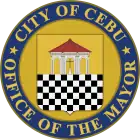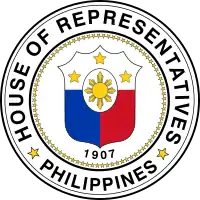Leandro Tojong
Leandro Tojong (March 13, 1905) was Filipino Visayan physician, patriot, and politician from Cebu, Philippines. He was ranked Captain in the resistance movement against the Japanese, Mayor of Cebu City (1945–1946), and member of the House of Representatives (1946–1953).
Leandro Tojong | |
|---|---|
| Member of the 1st Congress of the Republic for Cebu's 5th district | |
| In office 1946–1949 | |
| Preceded by | Miguel Cuenco |
| Succeeded by | Miguel Cuenco |
| Member of the 2nd Congress of the Republic for Cebu's 2nd district | |
| In office 1949–1953 | |
| Preceded by | Vicente Logarta |
| Succeeded by | Vicente Logarta |
| Mayor of Cebu City | |
| In office 1945–1946 | |
| Preceded by | Juan Zamora |
| Succeeded by | Nicolas Escario |
| Personal details | |
| Born | March 13, 1905 Ginatilan, Cebu, Philippines |
| Nationality | Filipino |
| Political party | Liberal Party (Philippines) |
| Profession | Medical doctor |
Early life
Leandro Tojong was born in Ginatilan, Cebu on March 13, 1905.[1]
Career
A medical doctor by profession, Leandro Tojong established a hospital that was named after him.[2]
City Council
Tojong was one of the members of the council who were sworn into office by then Secretary of Interior, Elpidio Quirino, upon the inauguration of the new Cebu City Charter on February 24, 1937.[3]
On December 14, 1937, he was a member of the first elected Cebu City Council. He was again elected to the Council for another term on December 10, 1940.[4]
World War II
During World War II, he was part of the resistance movement and given the rank of Captain. His designation was at the 87th Regiment, 3rd Battalion's base hospital in Barili and Dumanjug. Later, he was commissioned as the unit's Assistant Civil Affairs Officer.[2]
Post-war
After the war, Leandro Tojong was the first Mayor of Cebu City appointed after the war by Sergio Osmeña[2] in 1945, succeeding Juan Zamora.[5] He was replaced later by Nicolas Escario a year after.[1]
In 1946, he was voted as member of the 1st Congress of the Republic in 1946 for old 5th legislative district of Cebu,[6] which was composed of the towns of Alegria, Badian, Boljoon, Ginatilan, Malabuyoc, Moalboal, Oslob, Samboan, Alcantara, and Santander.[2] On January 13, 1947, President Manuel Roxas appointed him as Member of the National Defense Committee of the House of Representatives when the Council of National Defense was created.[7]
As a candidate for the Liberal Party,[8] he was elected Congressman of the 2nd Congress of the Republic for the old 2nd district that comprised the municipalities of Cebu, Liloan, Mandaue, Opon (now Lapu-lapu City), Cordova, Compostela and Consolacion in 1949. He served until 1953.[2] However, he was unseated by the Vicente Logarta of the Nacionalista Party by virtue of the ruling by the House Electoral Tribunal on December 6, 1952.[8]
Historical commemoration
- Dr. Leandro Tojong Street in Lahug, Cebu City was named in his honor by virtue of City Ordinance No. 1194 enacted in 1985.[2]
References
- Tinga, Pablo S. (2009). CEBU: Yesterday, Today and Tomorrow. Cebu City Public Library: Saint Jude Book Publisher. p. 173.
- Oaminal, Clarence Paul (November 22, 2013). "Dr. Leandro Tojong Street, Cebu City". Retrieved May 21, 2019.
- Roadrunner. "Cebu City Officials". www.cebucity.gov.ph. Retrieved 2019-05-21.
- Mojares, Dr. Resil B. "Today in the History of Cebu" (PDF). www.library.usc.edu.ph. University of San Carlos. Retrieved May 21, 2019.
- Oaminal, Clarence Paul (February 22, 2019). "The first election for Cebu City mayor | The Freeman". philstar.com. Retrieved 2019-05-21.
- "ROSTER OF PHILIPPINE LEGISLATORS". www.congress.gov.ph. Congressional Library Bureau; House of Representatives. Retrieved May 21, 2019.
- "Executive Order No. 40, s. 1947 | GOVPH". Official Gazette of the Republic of the Philippines. Retrieved 2019-05-21.
- Mojares, Resil B. (1986). The Man who Would be President: Serging Osmena and Philippine Politics. M. Cacao.

